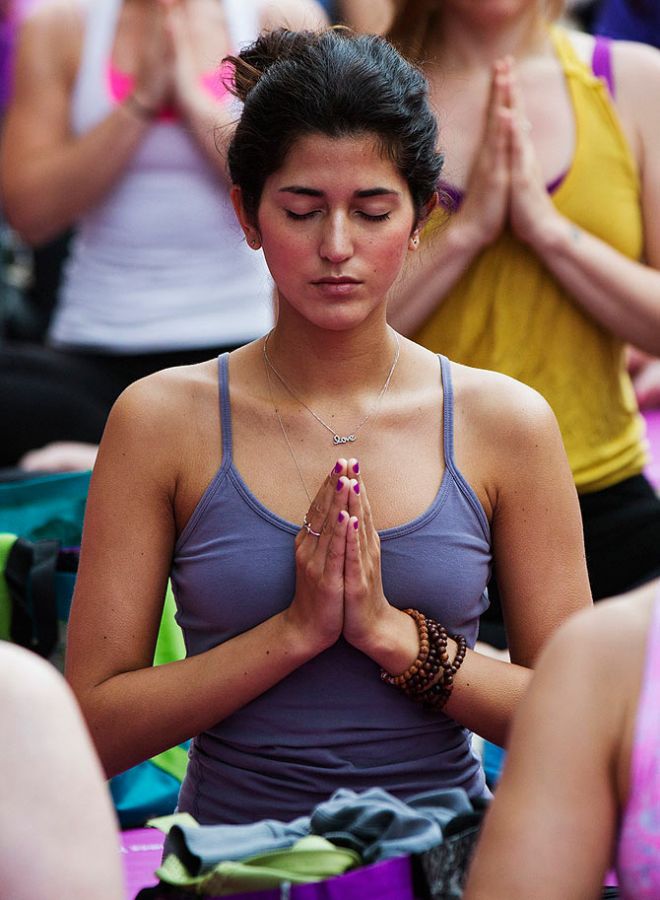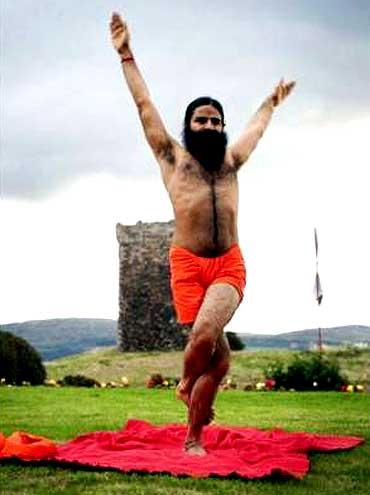Two fitness experts weigh in on what works for them in the ancient Indian practice and what doesn't
Learning to sit still

Photograph: Lucas Jackson/Reuters
My journey into yoga has been a story of inner transformation. People often think that asanas, or yogic postures, are synonymous with yoga but that isn't true. The asanas are just a small aspect of what yoga really is. Since I was three years old, I would spend long hours with my grandfather who would teach me to close my eyes and sit in one place, which I found very difficult to do. At the time I couldn't fathom the depth of what he was trying to tell me. Being a hyperactive kid, I was put into yoga school alongside regular school where I was taken through a series of asanas, pranayama and mudras, but things were still not as exciting as I wanted them to be. When I was eight, I met an amazing teacher who transformed the way I did some asanas and made them more interesting. He shared ancient stories about how the postures originated, and why it was so important to learn to control one's mind. I was mesmerised. The same things that my grandfather taught me started to make sense and I could sit for long periods meditating.
As I grew older, no matter what I did -- composing music, being part of a rock band or playing football -- yoga never left my side. I undertook my first teacher's training when I was 19 and kept studying, taking workshops all through college. Those were both fun and challenging times and I watched myself tackle situations simply through the strength and awareness I would find from my practice. When one is low on energy, one feels lethargic, upset or fearful; and when the same energy is high, one is joyous and equanimous. Yoga simply means being able to manage this flow of energy in the body and to keep it charged and powerful through abhyasa or practice.
Yoga has given me friends who are seekers, across age groups. We are now a growing family that wants to make a difference in the world no matter how small. I have started a community that honours not just the physical practice of asanas but absorbs all the eight pillars of yoga where understanding comes from a space in the heart -- a space of love and connectedness that brings one closer to themselves and others. "Kyogi", or karma yogi, was born out of this. A karma yogi is someone who stays within the chaos yet untouched by it, just like the lotus that blooms only in dirt and yet remains pristine.
Teaching classes and organising retreats in different parts of the world, working with children, elite athletes, golfers, footballers and dancers, have been a rewarding journey for me. I completed my master's in yoga and holistic sciences last year where the importance of ayurveda was reiterated. To understand yoga as a practice and a lifestyle has been greatly underplayed. World Yoga Day is not just a celebration of the ancient traditions that honour human life but also makes us more empathetic to the needs of other people and the environment. Ultimately, a yogi is one who keeps observing himself never taking anything for granted and understanding that change is the only constant while working to better himself and the world around him.
Varuna Shunglu is a yoga professional and wellness consultant based in Kolkata
***

Walking on my toes, but with caution
Bhagvad Gita and its teaching dawned early in my life. The red silk covered book sat as the most glorious jewel in my grandmother's temple. Revered and referred by others, it brought the concept of yoga to me personally, just like through yoga, Krishna explained the nuances of life to Arjuna.
However, my experiences with most of the yoga practitioners haven't been flattering. I am still wondering why we fell apart. Probably the true master has not come my way.
I still remember my first day at one of the group yoga classes. As a hard-nosed fitness professional, I took up hatha-yoga, primarily to improve my flexibility. The first 15 minutes had me dripping with sweat. Humbled by the routine, I knew it had ensnared me forever.
Science has been the bedrock of my work and I rigorously study the latest research in training and nutrition. Hence, it disappoints me, when half-baked knowledge and tall claims are presented to glorify yoga. I am more than happy walking on my toes to keep the spine aligned, but cannot believe that it is a cure for insomnia. Certain asanas being a cure for cancer, AIDS and even homosexuality are preposterous. Some yoga gurus have declared that eating animal protein harms the human body. Such tablets of wisdom, in my opinion, go against the grain of yoga.
My love for iron is no secret. When my soft-spoken yoga guru forbade weight training, it disturbed me immensely. Such advice, especially from professionals, are counter-productive. Yoga has withstood the vagaries of time because of its inclusive nature and it is difficult to understand its promotion at the expense of other fitness philosophies.
While I battled with these conflicts, yoga did improve my life. I overcame plateaus and ceilings of my regular leg workouts by centering myself. Pranayama helped me in long distance runs. So now, I prescribe yoga as a part of strength and aerobic programmes.
I want to mention that injuries from yoga are a reality. Imitating a supple yoga instructor overenthusiastically can strain the joints and tendons. It is as unsafe as any other form of exercise if done incorrectly.
Surya namaskar is one of the best total body exercises. However, it involves knee-bending moves which, if performed incorrectly, can do more harm than good. Even the simplest of side bends performed thoughtlessly can hurt the lower back. The plank posture is one of my favourite. Nothing builds a stronger core better. But if the shoulders are not positioned correctly, it can hurt the wrists before it strengthens the abdominal muscles. A lot of asanas involve balancing the body weight from a difficult position. Although an instructor performing them is a visual treat, but trying to imitate the same is never recommended. Most yoga instructors are young and naturally flexible, unlike those who are starting for the first time. Caution is necessary for an injury-free experience.
While all other fitness philosophies have teachers, trainers and coaches, yoga has a guru. A yoga guru has to walk with his disciple and ensure that he revels in his own worth, which is something marvellous.
Sudipta Dubey is head trainer and owner of New Delhi-based Als Fitness Centre
Note: Both photographs used only for representational purpose











